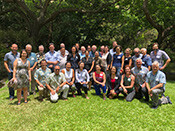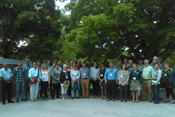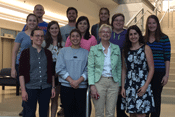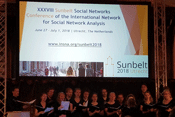How to make an ecosystem health report card
Are you interested in learning the complete report card process to leverage real environmental change in your area? Join IAN's online science communication course and get familiar with all the steps from stakeholder mapping and engagement and conceptualizing ecosystem function to selecting indicators and benchmarks, analyzing data, and communicating results. Sign up or learn more here.Drought in the US-Affiliated Pacific Islands
 Over the last three years, the USGS National Climate Adaptation Science Center has been working with IAN to lead a network-wide initiative at each of the eight regional Climate Adaptation Science Centers to identify the impacts of drought on ecosystems across the United States and how managers can plan for these impacts and adapt to changing conditions. On August 14-15, Simon Costanzo and Brianne Walsh traveled to Honolulu, Hawaii for a workshop on drought in the US-Affiliated Pacific Islands (USAPI). The 30 workshop participants explored the effects of previous droughts on agriculture, natural resources, and water supply through a series of presentations and breakout discussions. Workshop outcomes will be summarized in a newsletter, as well as factsheets used to communicate drought related issues on the islands.
Over the last three years, the USGS National Climate Adaptation Science Center has been working with IAN to lead a network-wide initiative at each of the eight regional Climate Adaptation Science Centers to identify the impacts of drought on ecosystems across the United States and how managers can plan for these impacts and adapt to changing conditions. On August 14-15, Simon Costanzo and Brianne Walsh traveled to Honolulu, Hawaii for a workshop on drought in the US-Affiliated Pacific Islands (USAPI). The 30 workshop participants explored the effects of previous droughts on agriculture, natural resources, and water supply through a series of presentations and breakout discussions. Workshop outcomes will be summarized in a newsletter, as well as factsheets used to communicate drought related issues on the islands.
IAN attends Tennessee River Basin Network planning meeting
 Heath Kelsey spoke at the annual Tennessee River Basin Network planning meeting in Knoxville, TN on August 13-14, about the next steps for the Tennessee River Report Card, which was released in February this year. One key item up for discussion was how to best use the report card as an outreach and awareness tool to highlight key issues in the basin. Data visualizations contained in the report card and methods document can also be used to prioritize particular areas of concern for soil erosion, forest protection, etc. The report card project also needs a local home and several organizations expressed interest in hosting or participating.
Heath Kelsey spoke at the annual Tennessee River Basin Network planning meeting in Knoxville, TN on August 13-14, about the next steps for the Tennessee River Report Card, which was released in February this year. One key item up for discussion was how to best use the report card as an outreach and awareness tool to highlight key issues in the basin. Data visualizations contained in the report card and methods document can also be used to prioritize particular areas of concern for soil erosion, forest protection, etc. The report card project also needs a local home and several organizations expressed interest in hosting or participating.
Science Communication Course at IMET
 On August 20-21 2018, Emily and Alex taught a science communication course for the graduate students at IMET in Baltimore, MD. This course not only introduced the students to science communication principals and best practices, but also included modules to learn Adobe software and apply that knowledge to the students' research. Their research ranged from striped bass and marine sponges to microplastics, with much of the work having real-world applications. Students enjoyed learning how to make their own symbols, and one student in particular created a new stingray symbol that will soon be incorporated into the IAN symbol library.
On August 20-21 2018, Emily and Alex taught a science communication course for the graduate students at IMET in Baltimore, MD. This course not only introduced the students to science communication principals and best practices, but also included modules to learn Adobe software and apply that knowledge to the students' research. Their research ranged from striped bass and marine sponges to microplastics, with much of the work having real-world applications. Students enjoyed learning how to make their own symbols, and one student in particular created a new stingray symbol that will soon be incorporated into the IAN symbol library.
IAN attends International Sunbelt Social Network Conference
 Last June 26-July 1, 2018, Vanessa Vargas Nguyen presented at the 38th International Sunbelt Social Network Conference in Utrecht, the Netherlands. The Sunbelt Conference is held annually and attended by researchers and practitioners of social network analysis whose research topics are inherently interdisciplinary. Vanessa's presentation was under the "Network approaches for understanding collaborative environmental governance" and featured other researchers interested in the application of socio-ecological network perspective in environmental governance.
Last June 26-July 1, 2018, Vanessa Vargas Nguyen presented at the 38th International Sunbelt Social Network Conference in Utrecht, the Netherlands. The Sunbelt Conference is held annually and attended by researchers and practitioners of social network analysis whose research topics are inherently interdisciplinary. Vanessa's presentation was under the "Network approaches for understanding collaborative environmental governance" and featured other researchers interested in the application of socio-ecological network perspective in environmental governance.